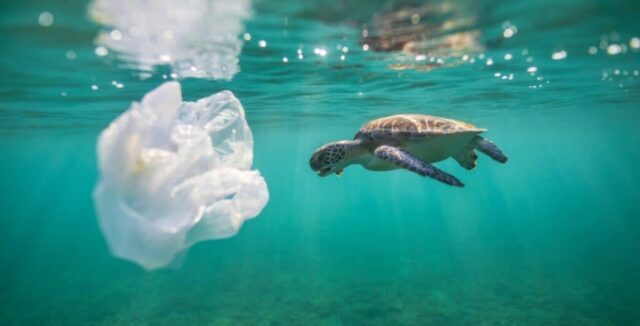Thirteen million metric tons of plastic enter the ocean every year, according to various studies, this is equivalent to one garbage truck that dumps its waste into the sea every minute. This reality threatens marine life and pollutes coastal areas.
By 2050, it is estimated that the amount of plastic in the ocean will exceed the total volume of marine life that inhabits it, but the disastrous consequences are already being seen, various marine animals are in danger: turtles, birds, fish, whales, dolphins, sharks and sea lions, are at risk of dying from becoming entangled in floating plastic or ingesting it.
“Every year 100,000 marine mammals and 1 million birds die, mistaking microplastics for food, which clog their throats or digestive tracts, causing them to die from starvation or malnutrition. Human beings are also part of that endangered list, since microplastics have been found in the intestinal system and the human placenta, coming from the ingestion of marine products,” said Jorge Serendero, spokesman for the For the Oceans Foundation.

Case Costa Rica
Such alarming data keeps NGOs that have formed coalitions to protect the oceans on their feet. Costa Rica does not escape bad practices, a country that stands out for having approximately 5% of the planet’s biodiversity, throws into the sea the equivalent of 15 plastic trucks per day.
Scientists from the Center for Research in Marine Sciences and Limnology (CIMAR) of the UCR, have identified more than 15,000 microplastics with sizes between 1 and 5 millimeters in the form of pellets, microbeads, plastic fragments and stereophones.
From here, For The Oceans Foundation, leads the fight to protect the oceans, seeks to coordinate initiatives and activities to help local authorities control illegal fishing, recover dangerous ghost nets for migratory wildlife; support research and scientific knowledge of the Eastern Pacific region, which includes marine waters, coastal areas and islands from the Central Pacific to the coasts of the American continent, including California, Mexico, Guatemala, El Salvador, Honduras, Nicaragua, Costa Rica , Panama, Colombia, Ecuador, Peru and Chile.
Various actions
Among its actions, the Foundation organizes and promotes beach cleanups thanks to volunteers, it has also managed to recover ghost nets and fishing lines abandoned by illegal fleets.
Serendero said that, “although some municipalities are adopting strategies for rational waste management, even in Costa Rica more action is needed and to supervise compliance with the existing national legislation that obliges all Municipalities to collect recyclable waste and separate it for different uses.”

For those who have experienced shifts in consciousness and know that more peace, joy, and love awaits in a better living environment. A bold shared vision. A living community and hub for innovation. A sustainable ecosystem for living and working. A model for the new future.
